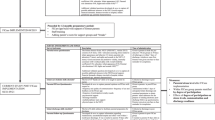Abstract
Objective:
To examine the views of parents and health-care providers regarding parental presence during neonatal intensive care rounds.
Study design:
Cross-sectional survey of parents whose children were admitted to a tertiary-care neonatal intensive care unit (n=81). Medical trainees (n=67) and nurses (n=28) were also surveyed.
Result:
The majority of parents reported that attending rounds reduced their anxiety and increased their confidence in the health-care team. Nurses were more likely than medical trainees to support parental presence at rounds (P=0.02). About three-quarters of medical trainees and nurses thought discussion is inhibited and 69% of trainees felt teaching is decreased when parents attend rounds.
Conclusion:
Most parents who attended rounds found the experience beneficial, but medical trainees’ views were mixed. The positive impact on parents, and the learning opportunities created in family-centered care and communication when parents are present on rounds, should be highlighted for trainees and other neonatal intensive care personnel.
This is a preview of subscription content, access via your institution
Access options
Subscribe to this journal
Receive 12 print issues and online access
$259.00 per year
only $21.58 per issue
Buy this article
- Purchase on Springer Link
- Instant access to full article PDF
Prices may be subject to local taxes which are calculated during checkout
Similar content being viewed by others
References
American Academy of Pediatrics. Family-centered care and the pediatrician's role. Pediatrics 2003; 112: 691–696.
Lewis C, Knopf D, Chastain-Lorber K, Ablin A, Zoger S, Matthay K et al. Patient, parent, and physician perspectives on pediatric oncology rounds. J Pediatr 1988; 112: 378–384.
Aronson PL, Yau J, Helfaer MA, Morrison W . Impact of family presence during pediatric intensive care unit rounds on the family and medical team. Pediatrics 2009; 124: 1119–1125.
Phipps LM, Bartke CN, Spear DA, Jones LF, Foerster CP, Killian ME et al. Assessment of parental presence during bedside pediatric intensive care unit rounds: effect on duration, teaching, and privacy. Pediatr Crit Care Med 2007; 8: 220–224.
Cameron MA, Schleien CL, Morris MC . Parental presence on pediatric intensive care unit rounds. J Pediatr 2009; 155: 522–528.
Knoderer H . Inclusion of parents in pediatric subspecialty team rounds: attitudes of the family and medical team. Acad Med 2009; 84: 1576–1581.
Latta LC, Dick R, Parry C, Tamura GS . Parental responses to involvement in rounds on a pediatric inpatient unit at a teaching hospital: a qualitative study. Acad Med 2008; 83: 292–297.
Kleiber C, Davenport T, Freyenberger B . Open bedside rounds for families with children in pediatric intensive care units. Am J Crit Care 2006; 15: 492–496.
McPherson G, Jefferson R, Kissoon N, Kwong L, Rasmussen K . Towards the inclusion of parents on pediatric critical care unit rounds. Pediatr Crit Care Med 2011; 12: e255–e261.
Rappaport DI, Cellucci MF, Leffler MG . Implementing family-centered rounds: Pediatric residents' perceptions. Clin Pediatr 2010; 49: 228–234.
Kalloghlian A . Parental presence during bedside pediatric intensive care unit rounds. Pediatr Crit Care Med 2007; 8: 291–292.
Cypress B . Family presence on rounds. Dimens Crit Care Nurs 2012; 31: 53–64.
Dellagrammaticas HD, Lacovidou N . Presence of parents during ward rounds: Experience from a Greek NICU [Letter]. Arch Dis Child Fetal Neonatal Ed 2006; 91: F466–F467.
Richardson D, Corcoran J, Escobar G, Lee S . SNAP-II and SNAPPE-II: Simplified newborn illness severity and mortality risk scores. J Pediatr 2001; 138: 92–100.
Black NMP, Kelly MN, Black EW, Sessums CD, DiPietro MK, Novak MA . Family-centered rounds and medical student education: a qualitative examination of students' perceptions. Hosp Pediatr 2011; 1: 24–29.
Rappaport DI, Ketterer TA, Nilforoshan V, Sharif I . Family-centered rounds: Views of families, nurses, trainees, and attending physicians. Clin Pediatr 2012; 51: 260–266.
Sisterhen LL, Blaszak RT, Woods MB, Smith CE . Defining family-centered rounds. Teach Learn Med 2007; 19: 319–322.
Acknowledgements
We acknowledge the families and health-care providers at Kingston General Hospital who completed the surveys, and the Department of Pediatrics at Queen’s University (Kingston, Ontario) for providing financial support for the study.
Author information
Authors and Affiliations
Corresponding author
Ethics declarations
Competing interests
The authors declare no conflict of interest.
Rights and permissions
About this article
Cite this article
Grzyb, M., Coo, H., Rühland, L. et al. Views of parents and health-care providers regarding parental presence at bedside rounds in a neonatal intensive care unit. J Perinatol 34, 143–148 (2014). https://doi.org/10.1038/jp.2013.144
Received:
Revised:
Accepted:
Published:
Issue Date:
DOI: https://doi.org/10.1038/jp.2013.144
Keywords
This article is cited by
-
Intervention, individual, and contextual determinants to high adherence to structured family-centered rounds: a national multi-site mixed methods study
Implementation Science Communications (2022)
-
NICU Hospitalization: Long-Term Implications on Parenting and Child Behaviors
Current Treatment Options in Pediatrics (2018)



